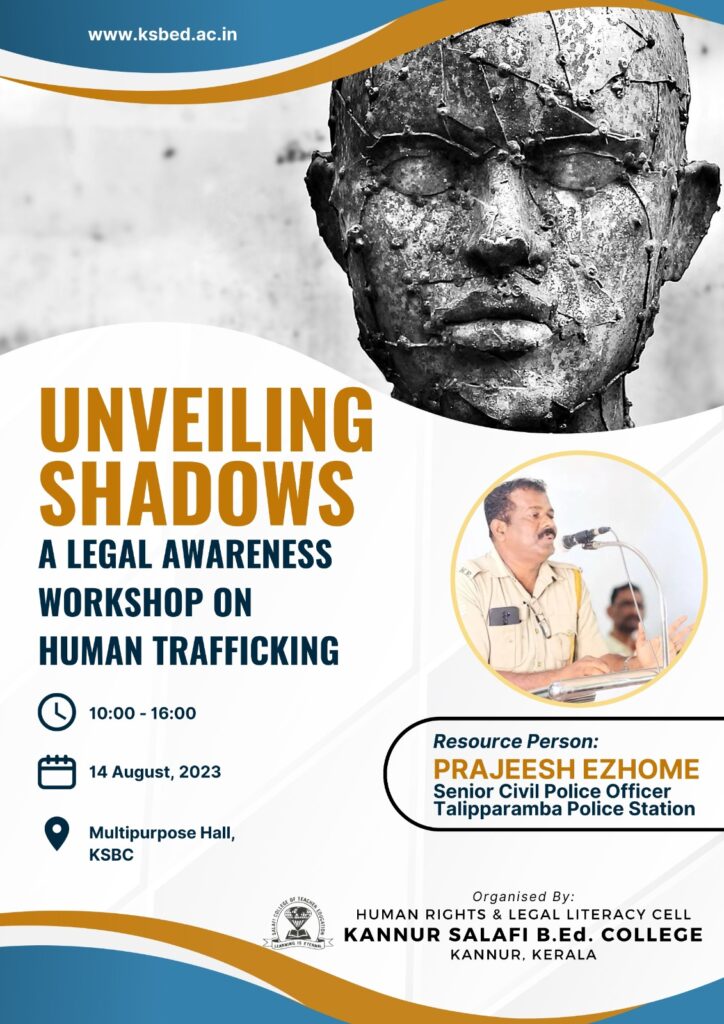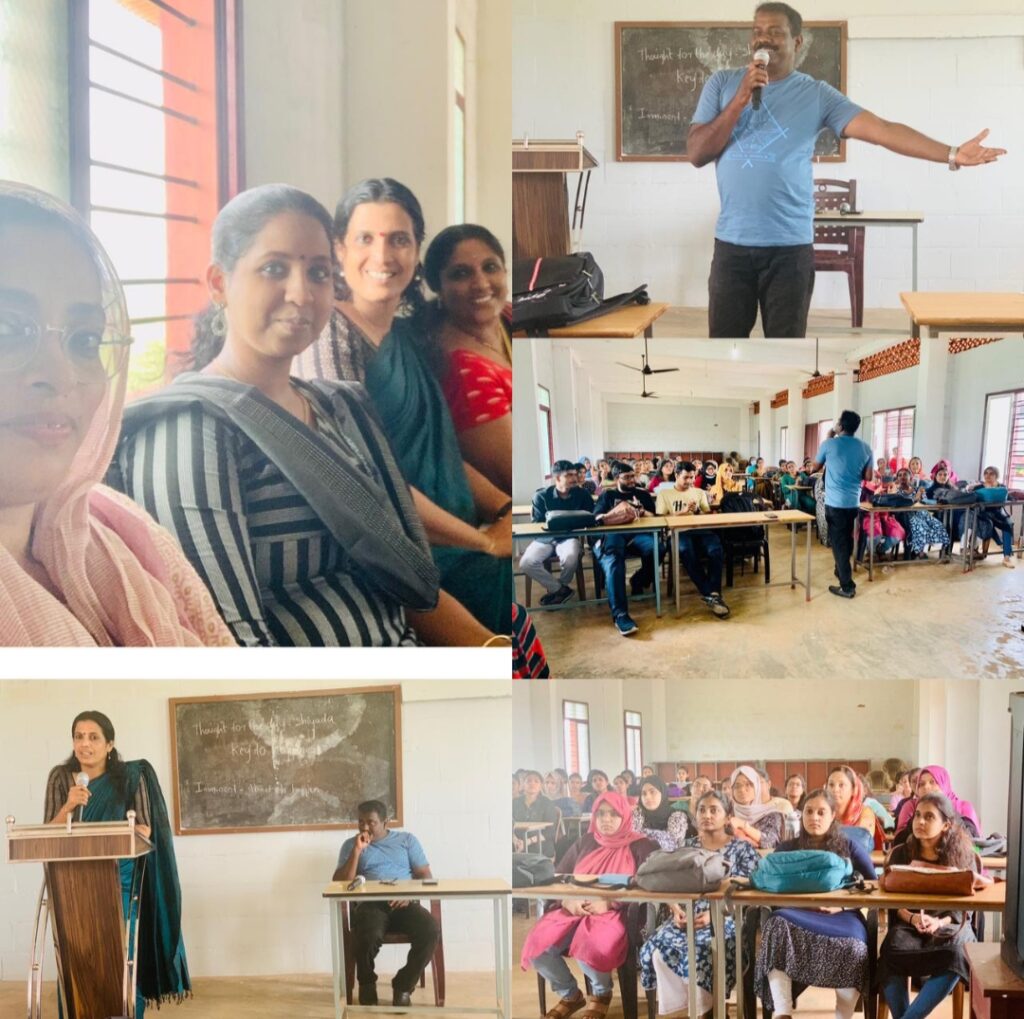The establishment of an anti-human trafficking cell in colleges is vital for creating a safe and supportive environment where students can pursue their education without fear of exploitation. By addressing the root causes of trafficking, raising awareness, and providing support to vulnerable populations, colleges can play a significant role in combating this global human rights issue. The establishment of an anti-human trafficking cell in colleges is of paramount importance due to several compelling reasons.
The formation of the Anti-Human Trafficking Cell at Kannur Salafi Bed College signifies a commitment to safeguarding the vulnerable and promoting social justice within our society. This initiative aims not only to raise awareness about the realities of human trafficking but also to actively engage in initiatives that disrupt trafficking networks, support survivors, and advocate for policy changes at local and national levels.
OBJECTIVES
- Prevention of Exploitation: College campuses can be vulnerable to human trafficking due to the presence of young and potentially vulnerable individuals. An anti-human trafficking cell plays a crucial role in raising awareness about the tactics used by traffickers and educating students on how to identify and avoid situations that could lead to exploitation.
- Protection of Vulnerable Populations: Many college students come from diverse backgrounds and may face socio-economic challenges that make them susceptible to trafficking. An anti-human trafficking cell provides support and resources to these vulnerable populations, helping to safeguard their rights and well-being.
- Promotion of Awareness and Education: By integrating anti-trafficking initiatives into college curricula and organizing awareness campaigns, the cell can educate students about the realities of human trafficking, its impact on individuals and communities, and the ways to combat it effectively.
- Early Intervention and Support: College campuses serve as a crucial point of contact where potential victims of trafficking may seek help or support. An anti-human trafficking cell ensures that appropriate resources and assistance are readily available for individuals who may be at risk or have experienced exploitation.
The cell facilitates collaboration between colleges, law enforcement agencies, NGOs, and other stakeholders involved in anti-trafficking efforts. By fostering partnerships, sharing information, and coordinating responses, the cell enhances the effectiveness of prevention and intervention strategies. Colleges often serve as recruitment grounds for various industries. An anti-human trafficking cell can advocate for ethical recruitment practices among employers and raise awareness about the risks of labour trafficking in industries that commonly employ college students, such as hospitality, agriculture, and entertainment.

Committee members of Anti Human Trafficking Club
Name of the Teacher Coordinator – Mrs Sudha M
Name of the student Coordinator – Ms. Haritha Prakashan
Members
- Anagha K P
- Shamsheer K
- Anagha T
- Adarsh K
- Sahad P S
- Arsha N K
- Aswin Raveendran
- Anjana Dineshan
- Shabhana M K
- Harikrishnan
- Agin Lakshmanan
- Krishnendu
- Anasooya P K
- Awasthi N
- Arya P K
- Anamika
- Nimya
- Angha E
- Jugnu
- Shiyada
- Farha K P
- Nithya N K

Date: August 14, 2023
Venue: Kannur Salafi B.Ed College
Kannur Salafi B.Ed College, committed to its social responsibility, organized a Legal Awareness Workshop on Human Trafficking on August 14, 2023. The event aimed to educate participants about the legal aspects surrounding human trafficking, raise awareness about its prevalence, and empower attendees with knowledge to combat this grave violation of human rights.
Workshop Highlights:
The workshop commenced with an introduction by the college administration, emphasizing the significance of understanding and addressing the issue of human trafficking in our society. Attendees, including students, faculty members and other staff members.
Resource Person:
Mr. Prejeesh Ezhome, a Senior Civil Police Officer from Taliparamba Police Station, served as the resource person for the workshop. With his extensive experience and expertise in dealing with human trafficking cases, Mr. Ezhome provided valuable insights into the legal framework governing human trafficking in India.
Mr. Prajeesh Ezhome elucidated the various forms of human trafficking, including forced labor, sexual exploitation, and organ trafficking, shedding light on the different tactics employed by traffickers to exploit vulnerable individuals.
Interactive Session:
The workshop featured an interactive session where participants engaged in discussions, posed questions, and shared their perspectives on combating human trafficking. Mr. Prajeesh Ezhome addressed queries raised by attendees, clarifying misconceptions and providing practical guidance on identifying and reporting trafficking incidents.
The Legal Awareness Workshop on Human Trafficking organized by Kannur Salafi B.Ed College served as a platform for fostering awareness, dialogue, and collaboration in the fight against human trafficking. Participants departed with a deeper understanding of the legal implications of trafficking and a renewed commitment to contribute to its eradication in their communities.
